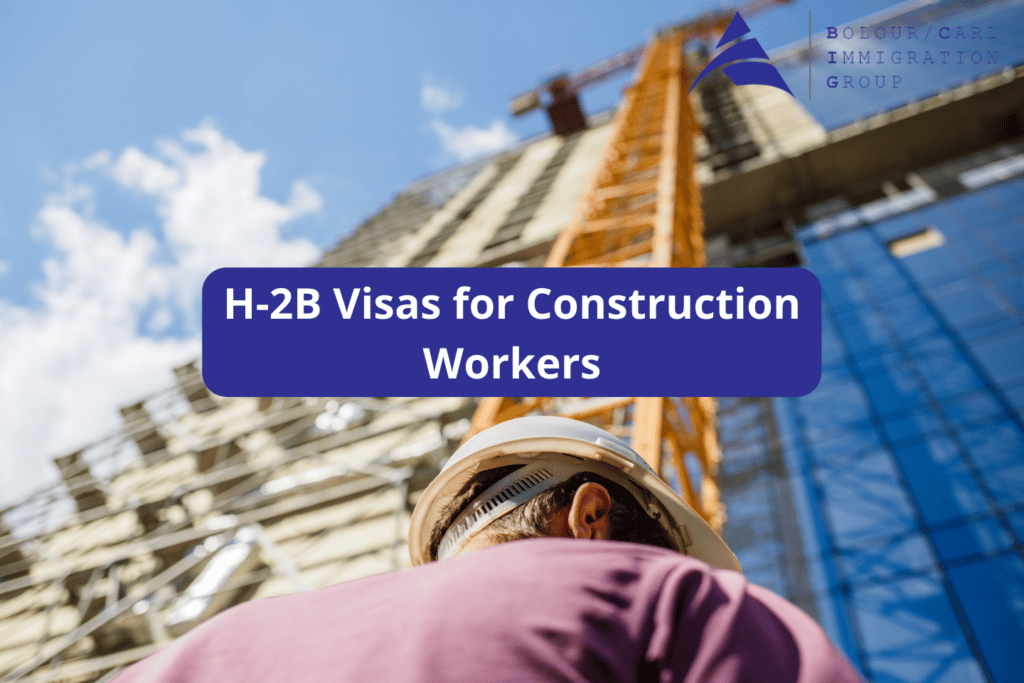
Construction companies are struggling to find workers due to ongoing labor shortages that were exacerbated by the pandemic. Labor shortages have led to project delays, increased project costs and safety concerns while forcing contractors to turn down work. For construction companies seeking talent – and for eligible foreign nationals looking to work in the United States – the H-2B non-immigrant visa program may be the solution. However, as it’s a complex application process requiring the timely and thorough completion of multiple steps, it is highly recommended that you work with an experienced employment visa lawyer with expertise in H-2B visas.
H-2B Visa Program
The H-2B visa program allows U.S. employers to fill full-time, temporary, non-agricultural positions with workers from approximately 80 eligible foreign countries. Employers must be able to demonstrate that they cannot find U.S. workers that are willing, able, qualified and available to do the work, and that hiring foreign nationals will not impact wages or working conditions of similarly employed U.S. workers.
H-2B visas are particularly popular in certain industries, including construction, where labor shortages have been a growing concern for more than a decade. When the housing market bottomed out in 2009-2011, many workers left the industry, never to return. Many other workers are approaching retirement age, and, for a variety of reasons, not enough younger U.S. workers are entering the industry. In the Associated General Contractors of America 2021 Workforce Survey, 89 percent of companies with open craft positions reported they were struggling to fill them.
The Need Must Be Temporary
In addition to showing an inability to recruit workers domestically, employers must demonstrate that their need for extra workers is, in fact, temporary, due to seasonal, intermittent or peak-load fluctuations in workflow or a one-time event of short duration.
In judging whether the need is temporary in nature, U.S. Citizenship and Immigration Services (USCIS) will analyze the list of worker duties, whether the proposed number of workers is necessary to perform these duties, and whether the need extends through the employment period requested.
Depending on their business, some construction companies may have a seasonal need for workers. For instance, a pool construction company may only have projects during certain times of the year. More commonly, construction companies often have a peak-load need for workers, which means they need to supplement permanent staff with temporary workers to meet a seasonal or short-term demand. For instance, a construction company whose areas of focus include K-12 school renovations may have more projects and therefore more demand for workers during the summer, when schools are closed. Similarly, a construction company with a concentration on outdoor projects may have more demand during the more temperate months of the year, when a greater number of projects happen.
To qualify for the H-2B visa program based on a one-time occurrence, companies would need to show they have not employed workers to perform a certain type of labor in the past, and they will not need workers to do it in the future. Alternately, petitioners could have an employment situation that is otherwise permanent, but a temporary event of short duration has created a need for temporary workers.
Petitioners are responsible for demonstrating that the period of need for workers is finite. H-2B visas are generally approved for up to nine months, except in the case of one-time events, for which visas can be approved for up to three years.
H-2B Visas Are Competitive
H-2B visas are typically capped at 66,000 per year, and demand for the program considerably outstrips supply. For fiscal 2022, which ends March 31, 2022, an additional 20,000 visas were temporarily added due to high demand. Even so, there were not enough visas for the number of applicants.
Complex Application Process
The H-2B visa application process is a complex process that can be broken down to three distinct phases:
- Employer applies for labor certification from the Department of Labor. This phase includes conducting a labor market test with the State Workforce Agency where the work will be performed.
- Employer petitions USCIS for approval to hire a specific number of workers under the H-2B visa classification.
- After USCIS approves the petition, workers apply with a Department of State visa-issuing embassy or consulate abroad for their H-2B visa.
Each step requires multiple tasks, and applications must be thoroughly completed, supported with multiple pieces of compelling evidence and submitted in a timely manner. Working with an experienced employment visa lawyer that has expertise in the H-2B program can go a long way in ensuring your application’s success.
If you are a U.S. employer looking to hire foreign national workers, or you are an eligible worker with a job offer from a U.S. company, contact Bolour/Carl’s employment-based visa lawyers for assistance at 323-857-0034 or [email protected].




